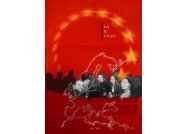turkish-greek civic dialogue - AEGEE Europe
turkish-greek civic dialogue - AEGEE Europe
turkish-greek civic dialogue - AEGEE Europe
Create successful ePaper yourself
Turn your PDF publications into a flip-book with our unique Google optimized e-Paper software.
of villagers, enjoying their hospitability accompanied by local wines and water<br />
melons and endless stories about the history of the village, and they were<br />
interviewing the villagers for the KayaFest video. They were also enjoying the<br />
sun at the village café accompanied by ryhtms of percussions and themy tea<br />
“kekik çayı”. They were using the primary school of the village as a workshop<br />
place and dancing, discussing, exploring each other.<br />
And the villagers were also all over the village observing all these colorful<br />
sights of the festival. They were watching the documentaries about the<br />
village together with participants, pointing their fingers on their grandparents<br />
they could see on the screens, constantly cooking and serving and smiling,<br />
smiling happily… And once it was over, they were also melancholic, seeing off<br />
their guests, thanking us to enable them to host people in their houses, for<br />
introducing them the home pension system,asking us when is the next one?<br />
After the completion of the festival the project coordination team had also<br />
evaluation meetings to listen the experiences, complaints and assessment of<br />
local stakeholders. Villagers, municipality, FETAV all agreed that it was useful<br />
for the promotion of the village, that the villagers made quite a lot of money.<br />
But they still voiced their concerns for the next time, that the stage and sound<br />
system was too big and proffessional and also loud, the exact location of the<br />
stage was not the best one were amongst their remarks…<br />
Sefer Güvenç from the Foundation of Lausanne Treaty Emigrants interviewed<br />
with Imam Halil. Imam Halil is the official prayer leader who calls the villagers<br />
for prayer. During the festival Greek participants were enjoying the prayer five<br />
times a day, and waking up very early with the call “ezan”, naming the very<br />
friendly İmam Halil as “DJ İmam”.<br />
I.H : “I was born in 1913 in Keçiler village. I have been working in this village<br />
for 27 years as Imam. I also helped villagers performing prayer. At that time in<br />
early 1900s, Greeks used to live here, as well as our nationals. The Greeks used<br />
to live in this village. It was reported that this village had 3000 house complexes.<br />
There were children at my age and we used to talk a lot, play marble, we<br />
used to go the shops together to buy candies, delights. My grandmother could<br />
understand their language. She used to have friends called Atine, Marine,<br />
Association des Etats Généraux des Etudiants de L’<strong>Europe</strong><br />
Michal, Andon. There was a doctor called Aliko, he could diagnose the diseases<br />
without any examination“<br />
SG: When the Greeks left the village, did they also take away their property,<br />
their belongings?<br />
I.H: The government did not let them to take gold or silver with them, but only<br />
cash. Therefore, they had to hide all their gold and silverware. Unfortunately<br />
the boats used for transport, could not allow loads or packs, but mostly people.<br />
Therefore, they were not allowed to take anything other than most essential<br />
belongings.<br />
S.G: How did you learn that they you would abandon the village?<br />
I.H: The government issued an order, they said until whatever day everybody<br />
has to get prepared for leaving. The Republic of Turkey was established. Atatürk<br />
became the president. All the legislation was completed and the decision of<br />
exchange of population was taken; so the emigrants from Thessaloniki came<br />
to Turkey.<br />
S.G: The Greeks had to abandon the village, but how did they leave?<br />
It was Us, the Turks, who did see them off. They could take their animals and<br />
some of the packages. However, the state sold out their precious belongings<br />
and other leftovers through auctions. Reversely, boats came to here, to Fethiye<br />
from Greece carrying emigrants from Greece.<br />
Later on, they came with horses and camels. They divided the abandoned lands<br />
and houses to these newcomers, emigrants from Greece. They pulled out he<br />
doors of the houses. Some of them sold the houses and left to Antalya and<br />
İzmir. At the end, our population remained around 15-20 thousand.<br />
S.G: Was there any competition or conflict between the Greek emigrants and<br />
the villagers?<br />
I.H: Conflict exits even between sisters and brothers. However, we were doing<br />
everything together, all kinds of exchange, trade, trade of brides, engagements<br />
and weddings.<br />
KayaFest Youth and Culture Festival<br />
115







